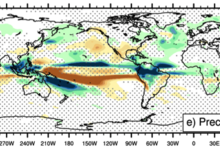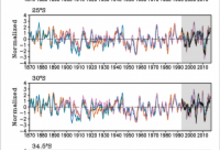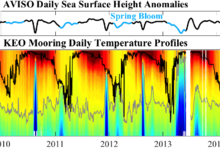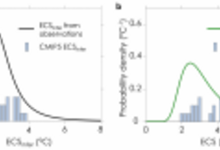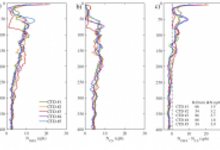Research Highlights
We aim to feature the latest research results from US scientists whose published paper features work that is sponsored by one or more sponsoring agency programs of US CLIVAR (NASA, NOAA, NSF, DOE, ONR). Check out the collection of research highlights below and sort by topic on the right. Interested in submitting an article for consideration? See our Research Highlight Submission Guidelines page for more information.
A multi-model simulation study shows that Atlantic Multidecadal Variability warming drives a modification of the Walker Circulation that creates precipitation anomalies over the whole tropical belt.
A new study reconstructs a century-long South Atlantic Meridional Overturning Circulation index, from 1870 to present, finding it is highly correlated to the observational-based SAMOC time series and the Interdecadal Pacific Oscillation is the leading mode of variability
Approximately seven years of daily-averaged autonomous CO2 observations from NOAA’s Kuroshio Extension Observatory surface mooring were used to close the mixed-layer carbon budget, finding high rates of net community production during the spring bloom period.
Equilibrium climate sensitivity (ECS) — defined as the near-surface air temperature change that would eventually result from a doubling of atmospheric CO2 — is a key metric of climate change. New findings suggest that the value of ECS estimated from global energy budget constraints is actually in agreement with values derived from other methods and simulated by global climate models.
A recent study highlights results obtained from an aircraft ocean survey that targeted a large warm core eddy in the eastern Caribbean Sea, where upper ocean measurements are crucial to understanding the complexities of heat and moisture transfer during the passage of tropical cyclones.

